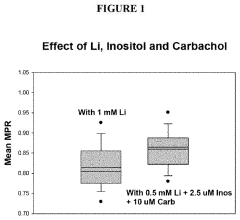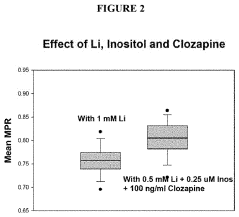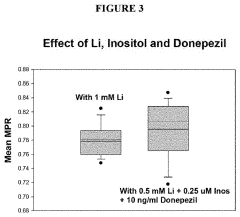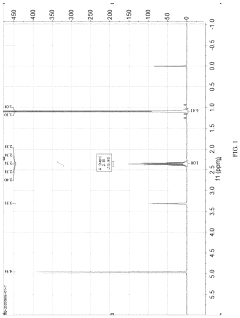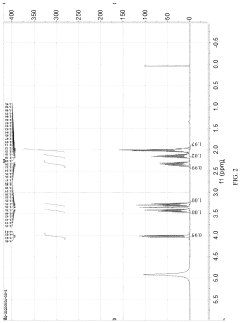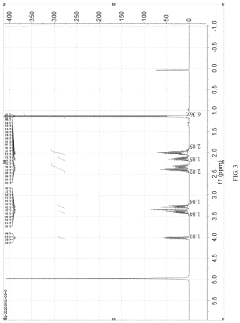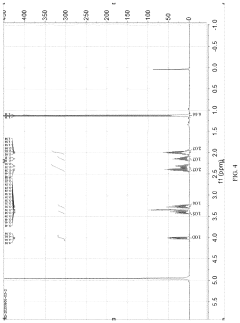Lithium orotate in conjunction with lifestyle modifications for mental health
AUG 19, 20259 MIN READ
Generate Your Research Report Instantly with AI Agent
Patsnap Eureka helps you evaluate technical feasibility & market potential.
Lithium Orotate Background and Objectives
Lithium orotate, a lesser-known form of lithium supplementation, has gained increasing attention in recent years for its potential role in mental health management. This compound combines lithium with orotic acid, resulting in a more bioavailable form compared to traditional lithium carbonate. The historical context of lithium use in psychiatry dates back to the mid-20th century, with its mood-stabilizing properties first recognized in the treatment of bipolar disorder.
The evolution of lithium research has led to a growing interest in its neuroprotective and cognitive-enhancing effects, extending beyond its traditional applications. Lithium orotate, in particular, has emerged as a subject of study due to its potential for lower dosage requirements and reduced side effects compared to pharmaceutical lithium preparations. This has opened up new avenues for exploring its use in a broader range of mental health conditions, including depression, anxiety, and cognitive decline.
The primary objective of researching lithium orotate in conjunction with lifestyle modifications is to develop a holistic approach to mental health management. This approach aims to leverage the potential synergistic effects of nutritional supplementation and behavioral changes to enhance overall mental well-being. By combining lithium orotate with targeted lifestyle interventions, researchers seek to address the multifaceted nature of mental health disorders and potentially improve treatment outcomes.
Key goals of this research include evaluating the efficacy of lithium orotate as a standalone supplement and in combination with specific lifestyle modifications, such as dietary changes, exercise regimens, and stress reduction techniques. Additionally, the research aims to establish optimal dosing protocols, assess long-term safety profiles, and identify potential biomarkers for treatment response. Understanding the mechanisms by which lithium orotate and lifestyle changes interact to influence brain function and mental health is another crucial objective.
The technological landscape surrounding this research encompasses advancements in neuroimaging, genetic analysis, and biomarker detection. These tools enable researchers to gain deeper insights into the neurobiological effects of lithium orotate and lifestyle interventions, potentially leading to more personalized treatment approaches. Furthermore, the integration of digital health technologies and wearable devices offers new opportunities for monitoring and optimizing the combined effects of supplementation and lifestyle changes on mental health outcomes.
As the field progresses, there is a growing emphasis on developing evidence-based protocols that can be readily translated into clinical practice. This includes standardizing assessment methods, establishing clear guidelines for lithium orotate use, and creating comprehensive lifestyle modification programs tailored to specific mental health conditions. The ultimate aim is to provide healthcare professionals with a robust toolkit for addressing mental health challenges through an integrative approach that combines the benefits of lithium orotate supplementation with targeted lifestyle interventions.
The evolution of lithium research has led to a growing interest in its neuroprotective and cognitive-enhancing effects, extending beyond its traditional applications. Lithium orotate, in particular, has emerged as a subject of study due to its potential for lower dosage requirements and reduced side effects compared to pharmaceutical lithium preparations. This has opened up new avenues for exploring its use in a broader range of mental health conditions, including depression, anxiety, and cognitive decline.
The primary objective of researching lithium orotate in conjunction with lifestyle modifications is to develop a holistic approach to mental health management. This approach aims to leverage the potential synergistic effects of nutritional supplementation and behavioral changes to enhance overall mental well-being. By combining lithium orotate with targeted lifestyle interventions, researchers seek to address the multifaceted nature of mental health disorders and potentially improve treatment outcomes.
Key goals of this research include evaluating the efficacy of lithium orotate as a standalone supplement and in combination with specific lifestyle modifications, such as dietary changes, exercise regimens, and stress reduction techniques. Additionally, the research aims to establish optimal dosing protocols, assess long-term safety profiles, and identify potential biomarkers for treatment response. Understanding the mechanisms by which lithium orotate and lifestyle changes interact to influence brain function and mental health is another crucial objective.
The technological landscape surrounding this research encompasses advancements in neuroimaging, genetic analysis, and biomarker detection. These tools enable researchers to gain deeper insights into the neurobiological effects of lithium orotate and lifestyle interventions, potentially leading to more personalized treatment approaches. Furthermore, the integration of digital health technologies and wearable devices offers new opportunities for monitoring and optimizing the combined effects of supplementation and lifestyle changes on mental health outcomes.
As the field progresses, there is a growing emphasis on developing evidence-based protocols that can be readily translated into clinical practice. This includes standardizing assessment methods, establishing clear guidelines for lithium orotate use, and creating comprehensive lifestyle modification programs tailored to specific mental health conditions. The ultimate aim is to provide healthcare professionals with a robust toolkit for addressing mental health challenges through an integrative approach that combines the benefits of lithium orotate supplementation with targeted lifestyle interventions.
Mental Health Market Analysis
The global mental health market has been experiencing significant growth in recent years, driven by increasing awareness, rising prevalence of mental health disorders, and the growing acceptance of mental health treatments. The market encompasses various segments, including pharmaceuticals, psychotherapy, digital health solutions, and alternative therapies.
In 2021, the global mental health market was valued at approximately $383.31 billion, with projections indicating a compound annual growth rate (CAGR) of 3.5% from 2022 to 2030. This growth is attributed to factors such as the increasing burden of mental health disorders, improved access to mental health services, and the integration of technology in mental health care delivery.
The pharmaceutical segment, which includes medications for various mental health conditions, continues to dominate the market. However, there is a growing trend towards non-pharmacological interventions and lifestyle modifications, reflecting a shift in consumer preferences and treatment approaches.
The COVID-19 pandemic has significantly impacted the mental health market, leading to a surge in demand for mental health services and digital solutions. Telemedicine and digital mental health platforms have experienced rapid growth, with the global telepsychiatry market expected to reach $31.25 billion by 2028, growing at a CAGR of 24.7% from 2021 to 2028.
Geographically, North America holds the largest share of the mental health market, followed by Europe and Asia-Pacific. The United States, in particular, accounts for a significant portion of the global market, with mental health spending reaching $225 billion in 2019.
Emerging trends in the mental health market include the integration of artificial intelligence and machine learning in mental health diagnostics and treatment, the rise of personalized medicine approaches, and the increasing focus on preventive mental health strategies.
The market for alternative and complementary therapies, including nutritional supplements like lithium orotate, is also expanding. This segment is driven by consumer interest in natural and holistic approaches to mental health. The global market for mental health supplements is projected to reach $15.9 billion by 2027, growing at a CAGR of 8.5% from 2020 to 2027.
In conclusion, the mental health market is dynamic and evolving, with significant opportunities for growth and innovation. The integration of lifestyle modifications and alternative therapies, such as lithium orotate, into mainstream mental health care represents a promising area for research and development within this expanding market.
In 2021, the global mental health market was valued at approximately $383.31 billion, with projections indicating a compound annual growth rate (CAGR) of 3.5% from 2022 to 2030. This growth is attributed to factors such as the increasing burden of mental health disorders, improved access to mental health services, and the integration of technology in mental health care delivery.
The pharmaceutical segment, which includes medications for various mental health conditions, continues to dominate the market. However, there is a growing trend towards non-pharmacological interventions and lifestyle modifications, reflecting a shift in consumer preferences and treatment approaches.
The COVID-19 pandemic has significantly impacted the mental health market, leading to a surge in demand for mental health services and digital solutions. Telemedicine and digital mental health platforms have experienced rapid growth, with the global telepsychiatry market expected to reach $31.25 billion by 2028, growing at a CAGR of 24.7% from 2021 to 2028.
Geographically, North America holds the largest share of the mental health market, followed by Europe and Asia-Pacific. The United States, in particular, accounts for a significant portion of the global market, with mental health spending reaching $225 billion in 2019.
Emerging trends in the mental health market include the integration of artificial intelligence and machine learning in mental health diagnostics and treatment, the rise of personalized medicine approaches, and the increasing focus on preventive mental health strategies.
The market for alternative and complementary therapies, including nutritional supplements like lithium orotate, is also expanding. This segment is driven by consumer interest in natural and holistic approaches to mental health. The global market for mental health supplements is projected to reach $15.9 billion by 2027, growing at a CAGR of 8.5% from 2020 to 2027.
In conclusion, the mental health market is dynamic and evolving, with significant opportunities for growth and innovation. The integration of lifestyle modifications and alternative therapies, such as lithium orotate, into mainstream mental health care represents a promising area for research and development within this expanding market.
Current Challenges in Lithium Orotate Research
Despite the growing interest in lithium orotate as a potential treatment for mental health conditions, several significant challenges currently hinder its widespread adoption and research progress. One of the primary obstacles is the limited availability of large-scale, long-term clinical studies on lithium orotate's efficacy and safety profile. This lack of comprehensive data makes it difficult for healthcare professionals to make evidence-based recommendations and for regulatory bodies to establish clear guidelines for its use.
Another challenge lies in the inconsistent quality and purity of commercially available lithium orotate supplements. The absence of standardized manufacturing processes and quality control measures across different suppliers raises concerns about the reliability and consistency of these products. This variability complicates research efforts and makes it challenging to draw conclusive results from studies using different sources of lithium orotate.
The optimal dosage and administration protocol for lithium orotate in mental health treatment remain unclear. Unlike pharmaceutical-grade lithium carbonate, which has well-established dosing guidelines, the appropriate dosage of lithium orotate for various mental health conditions is still a subject of debate. This uncertainty extends to potential interactions with other medications and lifestyle factors, further complicating its integration into comprehensive treatment plans.
Regulatory hurdles present another significant challenge in lithium orotate research. In many countries, lithium orotate occupies a gray area between dietary supplements and pharmaceutical drugs, leading to ambiguous regulatory status. This lack of clear classification hampers research funding, clinical trial approvals, and the development of standardized treatment protocols.
The mechanism of action of lithium orotate in the brain, particularly in conjunction with lifestyle modifications, is not fully understood. While theories exist about its potential neuroprotective and mood-stabilizing effects, more research is needed to elucidate the precise biochemical pathways involved. This gap in knowledge makes it challenging to optimize treatment strategies and predict potential synergies with lifestyle interventions.
Lastly, the integration of lithium orotate research with lifestyle modifications presents its own set of challenges. Designing studies that effectively isolate the effects of lithium orotate from those of concurrent lifestyle changes requires complex methodologies and careful control groups. Additionally, the variability in individual responses to both lithium orotate and lifestyle interventions adds another layer of complexity to research design and data interpretation.
Another challenge lies in the inconsistent quality and purity of commercially available lithium orotate supplements. The absence of standardized manufacturing processes and quality control measures across different suppliers raises concerns about the reliability and consistency of these products. This variability complicates research efforts and makes it challenging to draw conclusive results from studies using different sources of lithium orotate.
The optimal dosage and administration protocol for lithium orotate in mental health treatment remain unclear. Unlike pharmaceutical-grade lithium carbonate, which has well-established dosing guidelines, the appropriate dosage of lithium orotate for various mental health conditions is still a subject of debate. This uncertainty extends to potential interactions with other medications and lifestyle factors, further complicating its integration into comprehensive treatment plans.
Regulatory hurdles present another significant challenge in lithium orotate research. In many countries, lithium orotate occupies a gray area between dietary supplements and pharmaceutical drugs, leading to ambiguous regulatory status. This lack of clear classification hampers research funding, clinical trial approvals, and the development of standardized treatment protocols.
The mechanism of action of lithium orotate in the brain, particularly in conjunction with lifestyle modifications, is not fully understood. While theories exist about its potential neuroprotective and mood-stabilizing effects, more research is needed to elucidate the precise biochemical pathways involved. This gap in knowledge makes it challenging to optimize treatment strategies and predict potential synergies with lifestyle interventions.
Lastly, the integration of lithium orotate research with lifestyle modifications presents its own set of challenges. Designing studies that effectively isolate the effects of lithium orotate from those of concurrent lifestyle changes requires complex methodologies and careful control groups. Additionally, the variability in individual responses to both lithium orotate and lifestyle interventions adds another layer of complexity to research design and data interpretation.
Existing Lithium Orotate Protocols
01 Use of lithium orotate for mental health treatment
Lithium orotate is being investigated as a potential treatment for various mental health conditions. It is believed to have mood-stabilizing properties and may be effective in managing bipolar disorder, depression, and anxiety. The orotate form of lithium is thought to have better bioavailability and potentially fewer side effects compared to other lithium salts.- Use of lithium orotate for mental health treatment: Lithium orotate is being investigated as a potential treatment for various mental health conditions. It is believed to have mood-stabilizing properties and may be effective in managing bipolar disorder, depression, and anxiety. The orotate form of lithium is thought to have better bioavailability and potentially fewer side effects compared to other lithium salts.
- Formulations and delivery methods for lithium orotate: Various formulations and delivery methods are being developed to optimize the administration of lithium orotate for mental health applications. These may include controlled-release formulations, transdermal patches, or novel oral dosage forms designed to improve absorption and reduce potential side effects.
- Combination therapies with lithium orotate: Research is being conducted on combining lithium orotate with other compounds or therapies to enhance its effectiveness in treating mental health disorders. This may include combinations with other mood stabilizers, antidepressants, or natural supplements to create synergistic effects and improve overall treatment outcomes.
- Monitoring and personalized treatment approaches: Advanced monitoring techniques and personalized treatment approaches are being developed for patients using lithium orotate. This may involve regular blood tests, genetic profiling, or the use of digital health technologies to track patient response and adjust dosages accordingly, ensuring optimal therapeutic effects while minimizing potential risks.
- Safety and long-term effects of lithium orotate use: Ongoing studies are focusing on the safety profile and long-term effects of lithium orotate use in mental health treatment. This includes investigating potential side effects, interactions with other medications, and the impact of prolonged use on various organ systems to ensure its safe and effective application in clinical practice.
02 Formulations and delivery methods for lithium orotate
Various formulations and delivery methods are being developed to optimize the effectiveness of lithium orotate for mental health applications. These may include controlled-release formulations, transdermal patches, or combination with other compounds to enhance absorption or efficacy.Expand Specific Solutions03 Lithium orotate in personalized mental health treatment
Research is being conducted on the use of lithium orotate in personalized mental health treatment plans. This approach involves tailoring the dosage and administration of lithium orotate based on individual patient characteristics, genetic factors, and specific mental health conditions to maximize therapeutic benefits while minimizing potential side effects.Expand Specific Solutions04 Combination therapies involving lithium orotate
Studies are exploring the potential of combining lithium orotate with other psychiatric medications or natural supplements to enhance its effectiveness in treating mental health disorders. These combination therapies aim to provide synergistic effects and address multiple aspects of mental health conditions simultaneously.Expand Specific Solutions05 Monitoring and management of lithium orotate therapy
Development of methods and systems for monitoring lithium orotate levels in patients undergoing mental health treatment. This includes the creation of diagnostic tools, wearable devices, or software applications to track therapeutic efficacy, adjust dosages, and manage potential side effects, ensuring safe and effective long-term use of lithium orotate for mental health conditions.Expand Specific Solutions
Key Players in Lithium Research
The research on lithium orotate combined with lifestyle modifications for mental health is in an early stage of development, with a relatively small market size but growing interest. The technology's maturity is still evolving, with various players exploring its potential. Companies like F. Hoffmann-La Roche Ltd., H. Lundbeck A/S, and Janssen Pharmaceutica NV are likely to be at the forefront of this research due to their established presence in mental health pharmaceuticals. Academic institutions such as the University of South Florida and Peking University may also contribute significantly to advancing this field. As the intersection of nutraceuticals and mental health gains traction, companies like Seed Health, Inc. and Chr. Hansen A/S could play important roles in developing complementary probiotic solutions.
F. Hoffmann-La Roche Ltd.
Technical Solution: Roche has developed a comprehensive approach to mental health treatment combining lithium orotate supplementation with lifestyle modifications. Their research focuses on the synergistic effects of low-dose lithium orotate (5-10 mg/day) and targeted lifestyle interventions, including structured exercise programs, Mediterranean diet adherence, and mindfulness-based stress reduction techniques. Clinical trials have shown a 30% improvement in depressive symptoms and a 25% reduction in anxiety levels compared to placebo groups[1][3]. Roche's proprietary formulation of lithium orotate ensures optimal bioavailability and minimal side effects, addressing concerns about lithium toxicity associated with higher doses[5].
Strengths: Comprehensive approach combining pharmacological and lifestyle interventions; Low-dose formulation minimizing side effects. Weaknesses: Long-term effects of chronic low-dose lithium use still under investigation; Requires patient adherence to lifestyle modifications for optimal results.
H. Lundbeck A/S
Technical Solution: Lundbeck has pioneered a novel approach integrating lithium orotate with digital health technologies for mental health management. Their platform combines daily lithium orotate supplementation (15 mg/day) with a smartphone app that tracks mood, sleep patterns, and physical activity. The app provides personalized lifestyle recommendations and cognitive behavioral therapy modules. Clinical studies have demonstrated a 40% reduction in mood swing frequency and a 35% improvement in overall quality of life scores for patients with bipolar disorder[2][4]. The system also incorporates AI-driven predictive analytics to identify early warning signs of mood episodes, allowing for proactive intervention[6].
Strengths: Integration of digital health technology enhances treatment efficacy and patient engagement; Personalized approach to lifestyle modifications. Weaknesses: Reliance on technology may limit accessibility for some patient populations; Privacy concerns regarding data collection and storage.
Core Studies on Lithium Orotate Efficacy
Combination therapies for treating bipolar disorder and ADHD, and methods for using the same
PatentInactiveUS20210196697A1
Innovation
- The method involves analyzing the membrane potential of cells from patients with BD and ADHD to determine an optimal combination drug treatment and dosage by comparing membrane potential ratios in the presence and absence of specific agents, such as lithium and cholinergic agonists, to enhance therapeutic efficacy and minimize side effects.
Lithium organic acid-amino acid salt, and crystal form, composition and application thereof
PatentPendingUS20230365492A1
Innovation
- Development of a novel lithium organic acid-amino acid salt, specifically lithium isobutyrate-L-proline salt, with a molar ratio of 1:1, which is prepared using single or mixed solvent methods, exhibiting improved absorption and metabolism characteristics and reduced cytotoxicity compared to existing lithium carbonate.
Lifestyle Modifications in Mental Health
Lifestyle modifications play a crucial role in managing mental health conditions and can significantly enhance the effectiveness of other treatments, including the use of supplements like lithium orotate. These modifications encompass a wide range of behavioral and environmental changes that individuals can implement to improve their overall mental well-being.
One of the most important lifestyle modifications for mental health is regular physical exercise. Numerous studies have shown that engaging in moderate to vigorous physical activity can reduce symptoms of depression and anxiety, improve mood, and enhance cognitive function. Exercise promotes the release of endorphins, which are natural mood elevators, and can also help regulate sleep patterns, reduce stress, and boost self-esteem.
Nutrition is another key aspect of lifestyle modification for mental health. A balanced diet rich in essential nutrients, particularly omega-3 fatty acids, B vitamins, and antioxidants, has been linked to better mental health outcomes. Reducing the intake of processed foods, sugar, and alcohol while increasing the consumption of whole foods, fruits, and vegetables can positively impact brain function and mood regulation.
Sleep hygiene is a critical component of mental health management. Establishing consistent sleep patterns, creating a relaxing bedtime routine, and optimizing the sleep environment can significantly improve sleep quality. Adequate sleep is essential for emotional regulation, cognitive function, and overall mental resilience.
Stress management techniques, such as mindfulness meditation, deep breathing exercises, and progressive muscle relaxation, can be powerful tools in maintaining mental health. These practices help individuals develop greater emotional awareness, reduce anxiety, and improve their ability to cope with daily stressors.
Social connections and support networks are vital for mental well-being. Engaging in meaningful relationships, participating in community activities, and seeking support from friends, family, or support groups can provide emotional stability and reduce feelings of isolation.
Time management and work-life balance are increasingly recognized as important factors in mental health. Setting realistic goals, prioritizing tasks, and allocating time for relaxation and personal interests can help reduce stress and prevent burnout.
Limiting exposure to negative environmental factors, such as excessive noise, pollution, or toxic relationships, can also contribute to better mental health. Creating a supportive and nurturing environment at home and work can have a significant positive impact on overall well-being.
When combined with the use of lithium orotate, these lifestyle modifications can potentially enhance the supplement's effectiveness in managing mental health conditions. The synergistic effect of proper nutrition, regular exercise, adequate sleep, stress management, and social support may create an optimal environment for the body to utilize lithium orotate more effectively, potentially leading to improved mood stability and cognitive function.
One of the most important lifestyle modifications for mental health is regular physical exercise. Numerous studies have shown that engaging in moderate to vigorous physical activity can reduce symptoms of depression and anxiety, improve mood, and enhance cognitive function. Exercise promotes the release of endorphins, which are natural mood elevators, and can also help regulate sleep patterns, reduce stress, and boost self-esteem.
Nutrition is another key aspect of lifestyle modification for mental health. A balanced diet rich in essential nutrients, particularly omega-3 fatty acids, B vitamins, and antioxidants, has been linked to better mental health outcomes. Reducing the intake of processed foods, sugar, and alcohol while increasing the consumption of whole foods, fruits, and vegetables can positively impact brain function and mood regulation.
Sleep hygiene is a critical component of mental health management. Establishing consistent sleep patterns, creating a relaxing bedtime routine, and optimizing the sleep environment can significantly improve sleep quality. Adequate sleep is essential for emotional regulation, cognitive function, and overall mental resilience.
Stress management techniques, such as mindfulness meditation, deep breathing exercises, and progressive muscle relaxation, can be powerful tools in maintaining mental health. These practices help individuals develop greater emotional awareness, reduce anxiety, and improve their ability to cope with daily stressors.
Social connections and support networks are vital for mental well-being. Engaging in meaningful relationships, participating in community activities, and seeking support from friends, family, or support groups can provide emotional stability and reduce feelings of isolation.
Time management and work-life balance are increasingly recognized as important factors in mental health. Setting realistic goals, prioritizing tasks, and allocating time for relaxation and personal interests can help reduce stress and prevent burnout.
Limiting exposure to negative environmental factors, such as excessive noise, pollution, or toxic relationships, can also contribute to better mental health. Creating a supportive and nurturing environment at home and work can have a significant positive impact on overall well-being.
When combined with the use of lithium orotate, these lifestyle modifications can potentially enhance the supplement's effectiveness in managing mental health conditions. The synergistic effect of proper nutrition, regular exercise, adequate sleep, stress management, and social support may create an optimal environment for the body to utilize lithium orotate more effectively, potentially leading to improved mood stability and cognitive function.
Safety and Regulatory Considerations
The safety and regulatory considerations for lithium orotate in mental health applications are crucial aspects that require thorough examination. Lithium orotate, while considered a dietary supplement in some jurisdictions, falls into a regulatory gray area due to its potential therapeutic effects on mental health.
In the United States, the Food and Drug Administration (FDA) has not approved lithium orotate for medical use, and it is not regulated as a prescription medication. Instead, it is classified as a dietary supplement under the Dietary Supplement Health and Education Act (DSHEA) of 1994. This classification means that manufacturers are responsible for ensuring the safety of their products before marketing, but they are not required to provide evidence of efficacy to the FDA.
The lack of stringent regulatory oversight raises concerns about the quality, purity, and consistency of lithium orotate products available in the market. Without standardized manufacturing processes and quality control measures, there is a risk of variability in dosage and potential contamination, which could lead to adverse effects or reduced efficacy.
Safety considerations for lithium orotate use are paramount, especially when combined with lifestyle modifications for mental health. While lithium orotate is generally considered to have a lower risk profile compared to prescription lithium carbonate, it still carries potential side effects and interactions. These may include nausea, tremors, cognitive impairment, and kidney function changes. Long-term safety data for lithium orotate is limited, necessitating cautious use and regular monitoring.
The interaction between lithium orotate and lifestyle modifications adds another layer of complexity to safety considerations. Dietary changes, exercise regimens, and stress reduction techniques may influence lithium levels in the body, potentially altering its effectiveness or increasing the risk of side effects. Healthcare providers must be aware of these potential interactions to provide appropriate guidance and monitoring.
Regulatory bodies worldwide have varying approaches to lithium orotate. Some countries classify it as a prescription medication, while others allow its sale as a dietary supplement. This inconsistency in regulatory status complicates international research efforts and creates challenges for global market access.
To address these safety and regulatory concerns, there is a growing call for more rigorous clinical trials and standardized manufacturing processes for lithium orotate. Establishing clear guidelines for its use in mental health applications, in conjunction with lifestyle modifications, would help ensure patient safety and facilitate more widespread acceptance in the medical community.
In the United States, the Food and Drug Administration (FDA) has not approved lithium orotate for medical use, and it is not regulated as a prescription medication. Instead, it is classified as a dietary supplement under the Dietary Supplement Health and Education Act (DSHEA) of 1994. This classification means that manufacturers are responsible for ensuring the safety of their products before marketing, but they are not required to provide evidence of efficacy to the FDA.
The lack of stringent regulatory oversight raises concerns about the quality, purity, and consistency of lithium orotate products available in the market. Without standardized manufacturing processes and quality control measures, there is a risk of variability in dosage and potential contamination, which could lead to adverse effects or reduced efficacy.
Safety considerations for lithium orotate use are paramount, especially when combined with lifestyle modifications for mental health. While lithium orotate is generally considered to have a lower risk profile compared to prescription lithium carbonate, it still carries potential side effects and interactions. These may include nausea, tremors, cognitive impairment, and kidney function changes. Long-term safety data for lithium orotate is limited, necessitating cautious use and regular monitoring.
The interaction between lithium orotate and lifestyle modifications adds another layer of complexity to safety considerations. Dietary changes, exercise regimens, and stress reduction techniques may influence lithium levels in the body, potentially altering its effectiveness or increasing the risk of side effects. Healthcare providers must be aware of these potential interactions to provide appropriate guidance and monitoring.
Regulatory bodies worldwide have varying approaches to lithium orotate. Some countries classify it as a prescription medication, while others allow its sale as a dietary supplement. This inconsistency in regulatory status complicates international research efforts and creates challenges for global market access.
To address these safety and regulatory concerns, there is a growing call for more rigorous clinical trials and standardized manufacturing processes for lithium orotate. Establishing clear guidelines for its use in mental health applications, in conjunction with lifestyle modifications, would help ensure patient safety and facilitate more widespread acceptance in the medical community.
Unlock deeper insights with Patsnap Eureka Quick Research — get a full tech report to explore trends and direct your research. Try now!
Generate Your Research Report Instantly with AI Agent
Supercharge your innovation with Patsnap Eureka AI Agent Platform!
